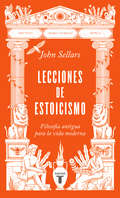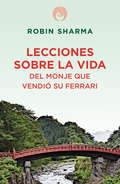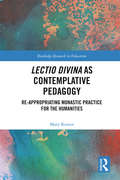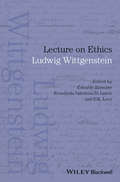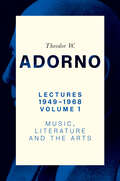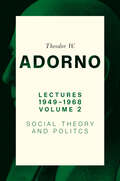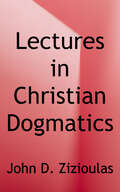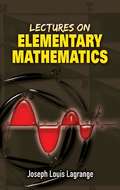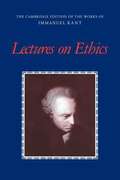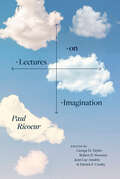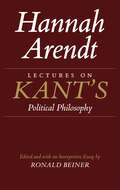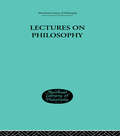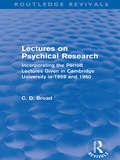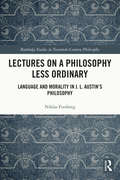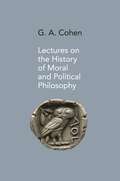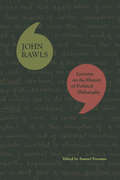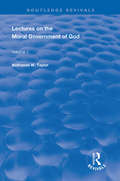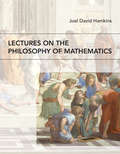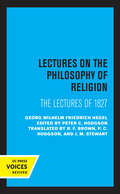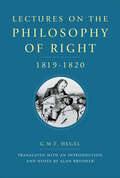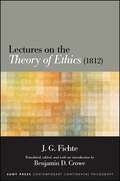- Table View
- List View
Lecciones de estoicismo
by John Sellars¿Qué nos enseñan los estoicos sobre cómo vivir? Un libro elegante y profundamente reconfortante que muestra por qué el estoicismo es la filosofía de nuestro tiempo. En los últimos tiempos se habla mucho de esta corriente, pero ¿cómo pensaban realmente sus miembros? John Sellars destila y entrelaza las ideas clave de los tres grandes estoicos romanos (Séneca, Epicteto y Marco Aurelio) ofreciendo también instantáneas de sus fascinantes vidas. Las obras de estos tres grandes tratan fundamentalmente sobre cómo vivir: entender nuestro lugar en el mundo, afrontar las adversidades, hacer un mejor uso del tiempo, controlar nuestras emociones y orientarnos en nuestras relaciones con los demás. Sus ideas pueden, en definitiva, guiarnos en nuestra búsqueda de una existencia más placentera. La crítica ha dicho:«Accesible y absorbente. Sellars es un escritor claramente comprometido con la misión de volver la filosofía clásica relevante hoy.»Roger Cox, The Scotsman «Un logro admirable. En una prosa elegante y concisa, nos insta a convertirnos en personas mejores y más felices centrándonos en la toma racional de decisiones.»Tim Whitmarsh, The Guardian «Un estudio conciso pero muy autorizado de la filosofía estoica dirigido a cualquier lector. Presenta el estoicismo de una manera accesible, pero se basa en muchos años de trabajo académico.»Donald Robertson, Medium «Una obra con muchas ventajas frente a otras del mismo género. Cubrir tanto terreno sin limitarse a lo superficial requiere una verdadera habilidad como escritor y como profesor.»Nigel Warburton, Five Books «No suelo leer filosofía, pero después de terminar este libro estoy convencida de que el viejo Séneca tenía razón.»Liz Jones, Mail on Sunday
Lecciones sobre la vida del monje que vendió su Ferrari
by Robin Sharma«Cuando naciste, llorabas mientras el mundo se regocijaba. Vive la vida de manera que cuando mueras el mundo llore mientras tú te regocijas.»Antiguo proverbio sánscrito¿Ha removido algo en su interior esa perla de sabiduría? ¿Siente que la vida se le escapa tan deprisa que nunca tendrá la oportunidad de vivir con la intensidad, la felicidad y la alegría que usted sabe que merece? ¿Cree que ha dilapidado su vida corriendo en pos del éxito en vez de llenarla de significados profundos? Si es así, esta especialísima obra del gurú del liderazgo Robin Sharma,cuya serie de El monje que vendió su Ferrari ha transformado la vida de miles de personas, será la luz que le abrirá las puertas deuna nueva manera de vivir. En este manual, ameno y lleno de sabiduría, Robin Sharma ofrece 101 sencillas soluciones a los problemas más complejos de la vida, desde un poco conocido método para combatir el estrés y la preocupación hasta un modo eficacísimo de disfrutar de la vida, al tiempo que se crea un legado perdurable. «Honra tu pasado», «Empieza bien el día», «Ve tus problemas como bendiciones» y «Descubre tu vocación» son otros ejemplos de cómo Sharma aborda la necesidad del cambio.
Lectio Divina as Contemplative Pedagogy: Re-appropriating Monastic Practice for the Humanities (Routledge Research in Education #16)
by Mary KeatorOffering an original application of the ancient monastic practice of lectio divina to the humanities, this book demonstrates the need for further emphasis on deep reading, reflection, and contemplation in contemporary university classrooms. Each chapter provides readers with an historical overview of the four movements of this monastic method: lectio (reading), meditatio (interpreting), oratio (responding), and contemplatio (experiencing wisdom), and suggests ways to incorporate these practices in humanites courses. Keator demonstrates that the lectio divina method is a viable pedagogical tool to guide students slowly and methodically through literary texts and into a subjective experience of wisdom and meaning.
Lecture on Ethics
by Ludwig WittgensteinThe most complete edition yet published of Wittgenstein’s 1929 lecture includes a never-before published first draft and makes fresh claims for its significance in Wittgenstein’s oeuvre. The first available print publication of all known drafts of Wittgenstein’s Lecture on Ethics Includes a previously unrecognized first draft of the lecture and new transcriptions of all drafts Transcriptions preserve the philosopher’s emendations thus showing the development of the ideas in the lecture Proposes a different draft as the version read by Wittgenstein in his 1929 lecture Includes introductory essays on the origins of the material and on its meaning, content, and importance
Lectures 1949-1968, Volume 1: Music, Literature and the Arts
by Theodor W. AdornoWhen Theodor W. Adorno returned to Germany from his exile in the United States, he was appointed as a lecturer and researcher at the University of Frankfurt and he immediately made a name for himself as a leading public intellectual. Adorno’s widespread influence on the postwar debates was due in part to the public lectures he gave outside of the university in which he analysed and commented on social, cultural and political developments of the time.This first volume brings together Adorno’s lectures given between 1949 and 1968 on music, literature and the arts. With an engaging and improvisational style, Adorno spoke with compelling enthusiasm on subjects as diverse as Marcel Proust’s prose, Richard Strauss’s composition technique and Arnold Schoenberg’s Pierrot lunaire. Germany, restoring its social and intellectual institutions, needed to embrace the new music and writers who had been neglected, particularly with regards to Proust. To rebuild was taken to mean rediscovery, but Adorno also nurtured a vision of tradition which – far from being unthinkingly conservative – would attest to society’s honestly-appraised relationship to the past while it underwent the process of modernization. The volume illustrates Adorno’s deep commitment to holding contemporary music and culture to standards commensurate with the aspirations of a modern world emerging from the horrors of war.This volume of his lectures is a unique document of Adorno’s startling ability to bring critical theory into dialogue with the times in which he lived. It will be of great value to anyone interested in the work of Adorno and critical theory, in German intellectual and cultural history and in the history of modern music and the arts.
Lectures 1949-1968, Volume 2: Social Theory and Politics
by Theodor W. AdornoWhen Theodor W. Adorno returned to Germany from his exile in the United States, he was appointed as a lecturer and researcher at the University of Frankfurt and he immediately made a name for himself as a leading public intellectual. Adorno’s widespread influence on the postwar debates was due in part to the public lectures he gave outside of the university in which he analysed and commented on social, cultural and political developments of the time. This second volume brings together Adorno’s lectures given between 1949 and 1968 on social and political themes. With an engaging and improvisational style, Adorno spoke with infectious vigour about architecture and city planning, the relationship between the individual and society, the authoritarian personality and far-right extremism, political education and the current state of sociology, among other subjects. After Auschwitz, it was incumbent on Germany to undertake intensive memory work and to confront the reality of its own moral destruction, while rebuilding its political and economic systems. To rebuild was taken to mean rediscovery and looking outward, but Adorno also nurtured a vision of tradition which – far from being unthinkingly conservative – would attest to society’s honestly-appraised relationship to the past while it underwent the process of modernization. The volume illustrates Adorno’s deep commitment to holding society to standards commensurate with the aspirations of a modern world emerging from the horrors of war. This volume of his lectures is a unique document of Adorno’s startling ability to bring critical theory into dialogue with the times in which he lived. It will be of great value to anyone interested in the work of Adorno and critical theory, in German intellectual and cultural history and in sociology and politics.
Lectures in Christian Dogmatics
by John D. ZizioulasIn this series of lectures on of the most eminent Christian theologians of our time, Metropolitan John Zizioulas, give his account of the fundamental teachings of Christian theology. <p><p>He presents Christian doctrine as a comprehensive account of the freedom that results from relationship with God. The whole lecture series lays out complex ideas with the utmost simplicity, illustrates the grandeur of Christian teaching, and is a profound exploration of freedom.
Lectures on Anthropology
by Immanuel Kant Allen W. Wood Robert B. Louden Allen W. Wood Robert R. Clewis Robert B. Louden G. Felicitas Munzel Immanuel Kant Robert B. Louden Allen W. Wood Robert R. Clewis G. Felicitas MunzelKant was one of the inventors of anthropology, and his lectures on anthropology were the most popular and among the most frequently given of his lecture courses. This volume contains the first translation of selections from student transcriptions of the lectures between 1772 and 1789, prior to the published version, Anthropology from a Pragmatic Point of View (1798), which Kant edited himself at the end of his teaching career. The two most extensive texts, Anthropology Friedländer (1772) and Anthropology Mrongovius (1786), are presented here in their entirety, along with selections from all the other lecture transcriptions published in the Academy edition, together with sizeable portions of the Menschenkunde (1781–1782), first published in 1831. These lectures show that Kant had a coherent and well-developed empirical theory of human nature bearing on many other aspects of his philosophy, including cognition, moral psychology, politics and philosophy of history.
Lectures on Elementary Mathematics (Dover Books on Mathematics)
by Joseph Louis LagrangeOne of the eighteenth century's greatest mathematicians, Lagrange made significant contributions to all fields of analysis and number theory. He survived the French Revolution to deliver these lectures in 1795 at the École Normale, a training school for teachers. An exemplar among elementary expositions, Lagrange's talks feature both originality of thought and elegance of expression.The five lectures begin with discussions of arithmetic that focus on fractions and logarithms as well as theory and applications. Subsequent talks consider algebra, with emphasis on the resolution of equations of the third and fourth degree, the resolution of numerical equations, and the employment of curves in the solution of problems. Students, teachers, and others with an interest in mathematics will find this volume a unique reading book in mathematics, with fascinating historical and philosophical remarks by a distinguished mathematician.
Lectures on Ethics
by Immanuel Kant Peter Heath J. B. SchneewindThis volume contains four versions of the lecture notes taken by Kant's students of his university courses in ethics given regularly over a period of some thirty years. The notes are very complete and expound not only Kant's views on ethics but many of his opinions on life and human nature. Much of this material has never before been translated into English. As with other volumes in the series, there are copious linguistic and explanatory notes and a glossary of key terms.
Lectures on Imagination
by Paul RicoeurRicoeur’s theory of productive imagination in previously unpublished lectures. The eminent philosopher Paul Ricoeur was devoted to the imagination. These previously unpublished lectures offer Ricoeur’s most significant and sustained reflections on creativity as he builds a new theory of imagination through close examination, moving from Aristotle, Pascal, Spinoza, Hume, and Kant to Ryle, Price, Wittgenstein, Husserl, and Sartre. These thinkers, he contends, underestimate humanity’s creative capacity. While the Western tradition generally views imagination as derived from the reproductive example of the image, Ricoeur develops a theory about the mind’s power to produce new realities. Modeled most clearly in fiction, this productive imagination, Ricoeur argues, is available across conceptual domains. His theory provocatively suggests that we are not constrained by existing political, social, and scientific structures. Rather, our imaginations have the power to break through our conceptual horizons and remake the world.
Lectures on Infinitary Model Theory
by David MarkerInfinitary logic, the logic of languages with infinitely long conjunctions, plays an important role in model theory, recursion theory and descriptive set theory. This book is the first modern introduction to the subject in forty years, and will bring students and researchers in all areas of mathematical logic up to the threshold of modern research. The classical topics of back-and-forth systems, model existence techniques, indiscernibles and end extensions are covered before more modern topics are surveyed. Zilber's categoricity theorem for quasiminimal excellent classes is proved and an application is given to covers of multiplicative groups. Infinitary methods are also used to study uncountable models of counterexamples to Vaught's conjecture, and effective aspects of infinitary model theory are reviewed, including an introduction to Montalbán's recent work on spectra of Vaught counterexamples. Self-contained introductions to effective descriptive set theory and hyperarithmetic theory are provided, as is an appendix on admissible model theory.
Lectures on Kant's Political Philosophy
by Hannah Arendt edited by Ronald BeinerHannah Arendt's last philosophical work was an intended three-part project entitled The Life of the Mind. Unfortunately, Arendt lived to complete only the first two parts, Thinking and Willing. Of the third, Judging, only the title page, with epigraphs from Cato and Goethe, was found after her death. As the titles suggest, Arendt conceived of her work as roughly parallel to the three Critiques of Immanuel Kant. In fact, while she began work on The Life of the Mind, Arendt lectured on "Kant's Political Philosophy," using the Critique of Judgment as her main text. The present volume brings Arendt's notes for these lectures together with other of her texts on the topic of judging and provides important clues to the likely direction of Arendt's thinking in this area.
Lectures on Kant's Political Philosophy
by Hannah Arendt“Beiner’s essay traces the development of Arendt’s thoughts on judgment and offers a lucid summary and thoughtful critique of the Kant lectures.” —William A. Galston, Journal of PoliticsHannah Arendt's last philosophical work was an intended three-part project entitled The Life of the Mind. Unfortunately, Arendt lived to complete only the first two parts, Thinking and Willing. Of the third, Judging, only the title page, with epigraphs from Cato and Goethe, was found after her death. As the titles suggest, Arendt conceived of her work as roughly parallel to the three Critiques of Immanuel Kant. In fact, while she began work on The Life of the Mind, Arendt lectured on “Kant's Political Philosophy,” using the Critique of Judgment as her main text. The present volume brings Arendt's notes for these lectures together with other of her texts on the topic of judging and provides important clues to the likely direction of Arendt's thinking in this area.“The central claim of the Lectures—skillfully edited and introduced by Ronald Beiner—is bold, imaginative, and risk taking . . . Arendt’s innovative insistence on general or enlarged aesthetic judgment as a clue to Kantian politics permits her to find a bridge from the beautiful to the practical that has remained unsuspected by other Kant interpreters.” —Patrick Riley, Political Theory“This small, carefully crafted book is a valuable addition to the Arendt literature . . . Beiner’s brilliantly executed reading of Arendt illuminates an important side of her thinking—and it is a pleasure to read.” —James T. Knauer, International Studies in Philosophy
Lectures on Philosophy
by George Edward MooreThis is Volume XV in a collection of twenty-two on 20th Century Philosophy. First published in 1966, as a part of the Muirhead library of Philosophy this work consists of selections from three courses of lectures. The first course was given in the academic year 1925-26, the second in 1928-29, and the third in 1933-34. The first two (entitled “ Metaphysics” ) were intended primarily for Part II of the Moral Sciences Tripos; the last (entitled “ Elements of Philosophy” ) for Part I. (The selections from the second course, which are the most extensive, are printed first.)
Lectures on Psychical Research: Incorporating the Perrott Lectures Given in Cambridge University in 1959 and 1960 (Routledge Revivals)
by C. D. BroadThis book, first published in 1962, is based on a series of lectures first given at Cambridge University in 1959 and 1960, dealing with 'psychical research' - i.e. the scientific investigation of ostensibly paranormal phenomena. Split into three sections, Professor Broad's study examines numerous issues relating to psychical theory, including guessing, hallucinatory quasi-perception and trance-mediumship.
Lectures on a Philosophy Less Ordinary: Language and Morality in J.L. Austin’s Philosophy (Routledge Studies in Twentieth-Century Philosophy)
by Niklas ForsbergThis book offers a comprehensive reinterpretation of J.L. Austin’s philosophy. It opens new ways of thinking about ethics and other contemporary issues in the wake of Austin’s philosophical work. Austin is primarily viewed as a philosopher of language whose work focused on the pragmatic aspects of speech. His work on ordinary language philosophy and speech act theory is seen as his main contribution to philosophy. This book challenges this received view to show that Austin used his most well-known theoretical notions as heuristic tools aimed at debunking the fact/value dichotomy. Additionally, it demonstrates that Austin’s continual returns to the ordinary is rooted in a desire to show that our lives in language are complicated and multifaceted. What emerges is an attempt to think with Austin about problems that are central to philosophy today—such as the question about linguistic inheritance, truth, the relationship between a language inherited and morality, and how we are to cope with linguistic elasticity and historicity. Lectures on a Philosophy Less Ordinary will appeal to scholars and advanced students working on Austin’s philosophy, philosophy of language, and the history of analytic philosophy.
Lectures on the History of Moral and Political Philosophy
by Jonathan Wolff G. A. CohenPreviously unpublished writings from one of the most important political philosophers of recent timesG. A. Cohen was one of the leading political philosophers of recent times. He first came to wide attention in 1978 with the prize-winning book Karl Marx's Theory of History: A Defence. In subsequent decades his published writings largely turned away from the history of philosophy, focusing instead on equality, freedom, and justice. However, throughout his career he regularly lectured on a wide range of moral and political philosophers of the past. This volume collects these previously unpublished lectures.Starting with a chapter centered on Plato, but also discussing the pre-Socratics as well as Aristotle, the book moves to social contract theory as discussed by Hobbes, Locke, and Hume, and then continues with chapters on Kant, Hegel, and Nietzsche. The book also contains some previously published but uncollected papers on Marx, Hobbes, and Kant, among other figures. The collection concludes with a memoir of Cohen written by the volume editor, Jonathan Wolff, who was a student of Cohen's.A hallmark of the lectures is Cohen's engagement with the thinkers he discusses. Rather than simply trying to render their thought accessible to the modern reader, he tests whether their arguments and positions are clear, sound, and free from contradiction. Throughout, he homes in on central issues and provides fresh approaches to the philosophers he examines. Ultimately, these lectures teach us not only about some of the great thinkers in the history of moral and political philosophy, but also about one of the great thinkers of our time: Cohen himself.
Lectures on the History of Political Philosophy
by John Rawls Samuel FreemanThis last book by the late John Rawls, derived from written lectures and notes for his long-running course on modern political philosophy, offers readers an account of the liberal political tradition from a scholar viewed by many as the greatest contemporary exponent of the philosophy behind that tradition. <p><p> Rawls's goal in the lectures was, he wrote, "to identify the more central features of liberalism as expressing a political conception of justice when liberalism is viewed from within the tradition of democratic constitutionalism." He does this by looking at several strands that make up the liberal and democratic constitutional traditions, and at the historical figures who best represent these strands--among them the contractarians Hobbes, Locke, and Rousseau; the utilitarians Hume, Sidgwick, and J. S. Mill; and Marx regarded as a critic of liberalism. Rawls's lectures on Bishop Joseph Butler also are included in an appendix. Constantly revised and refined over three decades, Rawls's lectures on these figures reflect his developing and changing views on the history of liberalism and democracy--as well as how he saw his own work in relation to those traditions. <p> With its clear and careful analyses of the doctrine of the social contract, utilitarianism, and socialism--and of their most influential proponents--this volume has a critical place in the traditions it expounds. Marked by Rawls's characteristic patience and curiosity, and scrupulously edited by his student and teaching assistant, Samuel Freeman, these lectures are a fitting final addition to his oeuvre, and to the history of political philosophy as well.
Lectures on the History of Political Philosophy
by John RawlsThis last book by the late John Rawls, derived from written lectures and notes for his long-running course on modern political philosophy, offers readers an account of the liberal political tradition from a scholar viewed by many as the greatest contemporary exponent of the philosophy behind that tradition. Rawls’s goal in the lectures was, he wrote, “to identify the more central features of liberalism as expressing a political conception of justice when liberalism is viewed from within the tradition of democratic constitutionalism.” He does this by looking at several strands that make up the liberal and democratic constitutional traditions, and at the historical figures who best represent these strands—among them the contractarians Hobbes, Locke, and Rousseau; the utilitarians Hume, Sidgwick, and J. S. Mill; and Marx regarded as a critic of liberalism. Rawls’s lectures on Bishop Joseph Butler also are included in an appendix. Constantly revised and refined over three decades, Rawls’s lectures on these figures reflect his developing and changing views on the history of liberalism and democracy—as well as how he saw his own work in relation to those traditions. With its clear and careful analyses of the doctrine of the social contract, utilitarianism, and socialism—and of their most influential proponents—this volume has a critical place in the traditions it expounds. Marked by Rawls’s characteristic patience and curiosity, and scrupulously edited by his student and teaching assistant, Samuel Freeman, these lectures are a fitting final addition to his oeuvre, and to the history of political philosophy as well.
Lectures on the Moral Government of God (Routledge Revivals)
by Nathaniel W. TaylorOriginally compiled in 1859, this book is a collection of Nathaniel Taylor's lectures considering the moral government of God. The moral government of god was the great thought of Dr. Taylor's intellect, and the favourite theme of his instructons in theology; to vindicate the ways of God to man, was the object to which all Dr Taylor's energies were consecrated. This collection presents a complete and connected view of all that he wrote on this fundamental topic in theology, and to the lectures on moral government have been appended other essays and lectures on subjects that are naturally connected with this.
Lectures on the Philosophy of Mathematics
by Joel David HamkinsAn introduction to the philosophy of mathematics grounded in mathematics and motivated by mathematical inquiry and practice.In this book, Joel David Hamkins offers an introduction to the philosophy of mathematics that is grounded in mathematics and motivated by mathematical inquiry and practice. He treats philosophical issues as they arise organically in mathematics, discussing such topics as platonism, realism, logicism, structuralism, formalism, infinity, and intuitionism in mathematical contexts. He organizes the book by mathematical themes--numbers, rigor, geometry, proof, computability, incompleteness, and set theory--that give rise again and again to philosophical considerations.
Lectures on the Philosophy of Religion: The Lectures of 1827
by Georg Wilhelm HegelThis title is part of UC Press's Voices Revived program, which commemorates University of California Press’s mission to seek out and cultivate the brightest minds and give them voice, reach, and impact. Drawing on a backlist dating to 1893, Voices Revived makes high-quality, peer-reviewed scholarship accessible once again using print-on-demand technology. This title was originally published in 1988.
Lectures on the Philosophy of Right, 1819–1820
by G.W.F. HegelPublished in 1821, Outlines of the Philosophy of Right is considered the definitive articulation of the legal, moral, social, and political philosophy of G.W.F. Hegel. However, shortly before its publication, Hegel delivered a series of lectures on the subject matter of the work at the University of Berlin. These lectures are unlike any others Hegel gave on the philosophy of Right in that they do not supplement a published text but rather give a full and independent presentation of his mature political thought. Yet, they are also unlike Hegel’s formal treatise in that they form a smooth and flowing discourse, much like Hegel’s lectures on the philosophy of history, philosophy of art, philosophy of religion, and history of philosophy. Substantively, these lectures contain more extensive discussions of poverty and the proletariat than are found in Hegel’s published text – discussions that carry out the retreat from optimism about the present age intimated in the preface to Outlines but nowhere evident in the text itself. Translated with an introduction and notes by Alan Brudner, Hegel’s 1819/20 lectures on the philosophy of Right present his complete thoughts on law and the state in a manner that is more accessible and engaging than any other Hegelian text on these subjects.
Lectures on the Theory of Ethics (SUNY series in Contemporary Continental Philosophy)
by J. G. FichteTranslated here for the first time into English, this text furnishes a new window into the final phase of Fichte's career. Delivered in the summer of 1812 at the newly founded University of Berlin, Fichte's lectures on ethics explore some of the key concepts and issues in his evolving system of radical idealism. Addressing moral theory, the theory of education, the philosophy of history, and the philosophy of religion, Fichte engages both directly and indirectly with some of his most important contemporaries and philosophical rivals, including Kant, Schelling, and Hegel. Benjamin D. Crowe's translation includes extensive annotations and a German-English glossary. His introduction situates the text systematically, historically, and institutionally within an era of cultural ferment and intellectual experimentation, and includes a bibliography of recent scholarship on Fichte's moral theory and on the final period of his career.
